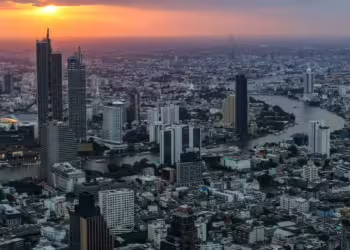No products in the basket.
The Thai economy showed positive signs in the third quarter of 2023. Foreign tourist arrivals increased, particularly from South Korea, India, the Middle East, Europe, and China.
Key Takeaways
- The Bank of Thailand expects improvements in economic growth for the country in the third quarter, driven by increased private consumption and a recovery in the tourism sector.
- The manufacturing sector, particularly the automobile and petroleum industries, contributed to the growth in merchandise exports, while private investment and public spending declined.
- The number of foreign tourists visiting Thailand increased, particularly from countries like South Korea and India, leading to a rise in tourist expenditures.
Thailand has welcomed 20 million foreign tourists so far this year, with September seeing a notable increase in arrivals, especially from South Korea and India. Tourist expenditures have also risen, although a recent incident at a Bangkok shopping mall may affect sentiment. Nonetheless, the government’s free visa policies and seasonal tourism trends are expected to help offset some of the impact.
In September 2023, the Thai economy continued to recover
Activities in the tourism sector continued to increase in line with the numbers of foreign tourists, while merchandise exports, excluding gold, also increased in several categories. Manufacturing production, however, remained at a similar level. Private spending softened in both consumption and investment after a good expansion in the preceding period. Public spending also contracted from both current and capital expenditures.
Merchandise exports saw growth in categories like jewelry, agricultural products, and agro-manufacturing products but declined in automobiles and electrical appliances. Merchandise imports increased in all major categories, including raw materials, capital goods, and consumer goods. Manufacturing production remained steady, with improvements in food and beverages, hard disk drives, and rubber and plastic, but a decrease in automobile and petroleum production.
On the economic stability front
Private investment indicators decreased, as did private consumption indicators for non-durable goods. Public spending contracted, and inflation declined in all major categories.
Headline inflation declined in all major categories. Fresh food prices decreased due to lower fruit, vegetable, and meat prices as supply increased. Energy inflation also declined thanks to government subsidies, which reduced electricity and diesel prices. Core inflation decreased due to lower prepared food prices. The labor market conditions continued to improve, while the current account registered a surplus, mainly due to an improvement in the trade balance.
Overall, the Thai economy expanded due to private consumption and recovery in the service sector, but private investment decreased.
Discover more from Thailand Business News
Subscribe to get the latest posts sent to your email.














